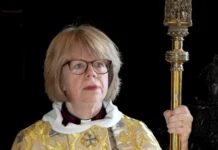As the Anglican Bishop of Newcastle, I make statements about significant matters affecting the community as well as the church.
Almost immediately there will be people who agree or disagree with the position I put forward. Sometimes the ferocity and longevity of the responses catches me by surprise, but in fairness, I have chosen to weigh in.
Before long, the comment usually arrives, ‘the church should stay out of politics’.
I don’t think the Bible writers saw it that way. As Jesus’ birth was foretold by Mary, God’s action is to bring down the powerful, empower those who struggle, ensure food security, and make sure the rich don’t dominate.
The man, born in humility, and visited by the outcast, embodies the ancient prophetic teaching of liberation, mercy, peace and justice.
Jesus’ life and ministry as well as the stories told about him were political. They point to a different social order and way of human interaction. At the centre of them is an understanding of God’s love which is to be reflected in human loving.
The church, being the body of believers and the institution which holds the body together, is meant to get involved in political discussions. Yet, unsurprisingly, the members of the church look and sound like their wider communities. Christians are red, green and blue.
As part of constructive debate, the wider community can and should expect church leaders who speak, to articulate the basis of their reasoning outlining the philosophical, biblical, theological, and historical foundations which inform their church. At there best, these contributions add a dimension or different perspective to the public discourse.
The challenge to church leaders is to move away from notions of Christian primacy and the assumption that, because we have articulated a position, it should be accepted by those who hold different world views. We are speakers in a market place of ideas.
Interestingly, on the whole Australians are open to hearing and considering faith-based ideas but do not want to be condemned or controlled by them. They want Christians to look and sound more like Jesus; hoping to see both humility and strength of character.
But what has this to do with Christmas?
The church-based word for God’s action in Bethlehem is incarnation. God choosing to take on human form. God deciding to dwell amongst us. God risks entering the messiness of creation to enable the bond between humanity, the cosmos, and God to be rekindled and restored.
The heart of the ministry of Christians is to witness to God’s continued bond of love.
Christians are called to speak and act lovingly as God’s agents of transformation of the world. Christmas is a repeated event when Christians embody God’s desire for justice, mercy and peace.
A society that is truly free from religious discrimination welcomes and empowers people of faith to speak of their insights in ways which are respectful and informative. It rejoices and learns from the contribution that people of faith make. It gains insight from the way religious people speak about enabling knowledge, gaining self-awareness, and fostering a common good.
My prayer is that the hope of the season inspires you and the blessing of God encourage you.
They are left, right, and central.



